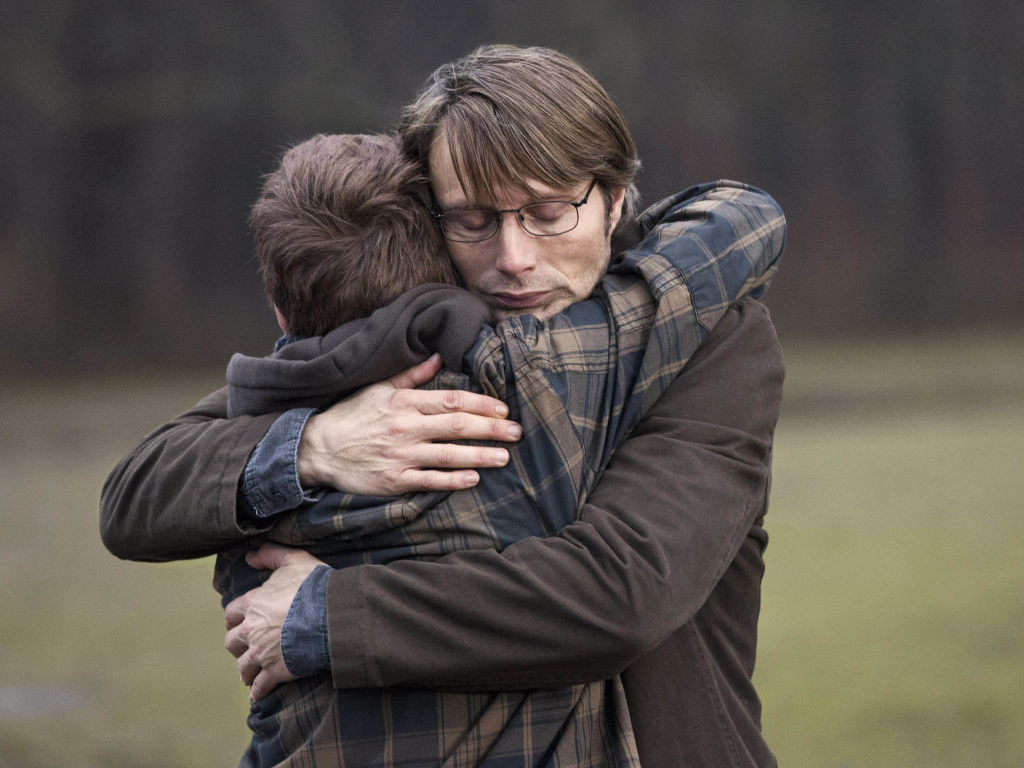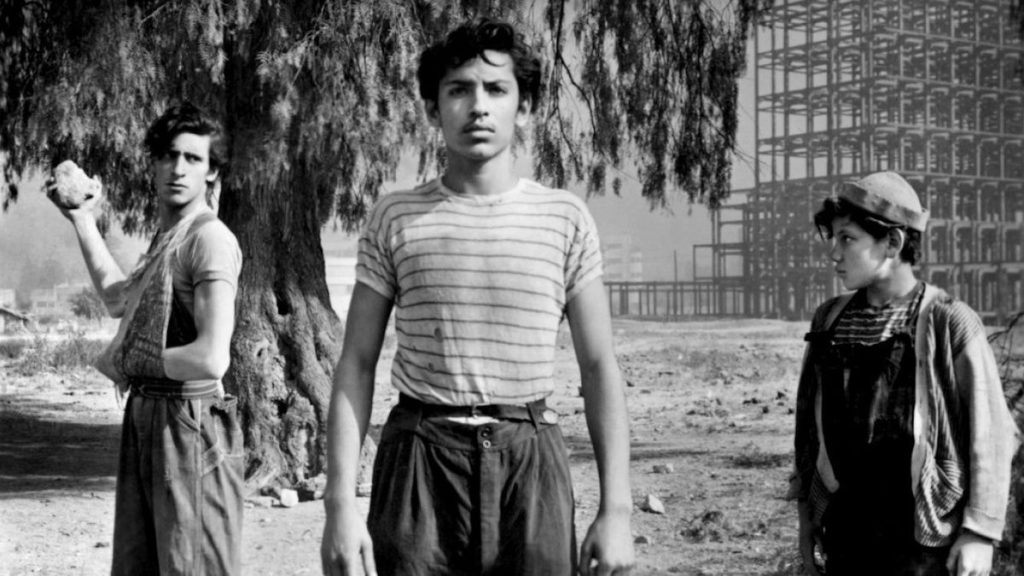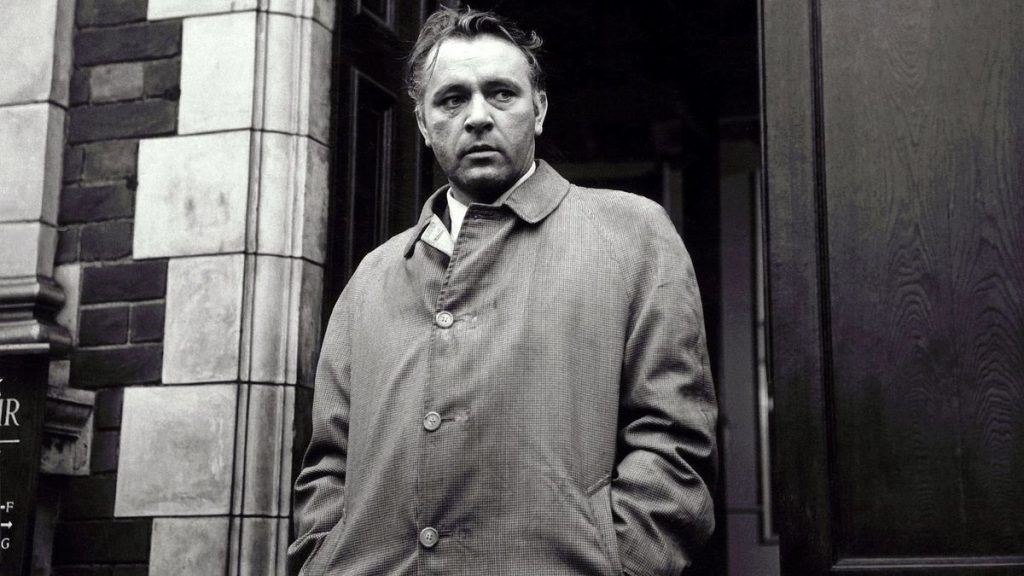This year, we’ll once again shine a light on unconventional Christmas movies that we feel are worth putting into your holiday viewing rotation. Follow along here.
Christmas movies want candy-coated Christianity. Their moral compass is just a generalized, rosy sense of goodwill that can easily forgive any Grinch or Scrooge whose greatest sin is temporarily killing the seasonal vibe. The Hunt, Thomas Vinterberg’s 2012 engrossing and enraging morality play, would be a bracing tonic after any typical holiday fare. It’s a Christmas movie that exposes the holiday for what it so often is: a flimsy, glittery veil that covers thornier questions of morality and charity that the season ought to embrace.
In the middle of November, Lucas (played by Mads Mikkelsen) is in a bit of a rut, He is in a contentious custody battle with his ex. The school where he worked has closed, and he has a new job as an assistant in a kindergarten in his hometown. This is viewed as an embarrassing demotion–and, as we will see, an odd position for a man. Yet Lucas is very good at his job: lively, intuitive, and kind. Just as things are looking up—he’s about to gain custody of his son and has begun a relationship with a woman from the kindergarten—disaster strikes. One of the kindergartners, who happens to be his best friend’s daughter, falsely accuses (for complicated reasons) Lucas of sexual abuse. As often happens in these cases, other children, unwittingly encouraged by well-meaning adults, come forward with further accusations. Even though these accusations contain important inconsistencies, they wreak havoc on his world, tarnishing his reputation in a small town, but also shattering his faith in his community.
At the time of The Hunt’s release, Mikkelsen’s performance was lauded, and rightly so. Initially, the arresting, inscrutable planes of his face, which evoke some ancient saint or dark angel, magically soften into quotidian handsomeness. Yet perhaps he is still too coldly beautiful to make sense as a schoolteacher—a fact, perhaps, that explains why one might believe the accusation.Yet there’s this soft playfulness and sincere gravity with which he responds to the child’s needs, which makes it all feel ridiculous. Mikkelsen is the Greta Garbo of our era; he has an implacable, perfectly sculpted face that can do everything with practically nothing. When Lucas is first accused, subtle waves of shock and horror ripple across Mikklesen’s face. Each time you think that he’s drained his wells of emotion, he manages to crumple further into himself.

If the traditional Christmas movie suppresses any conflict or moral ambiguity in favor of goodwill to all men, The Hunt exposes the underbelly of seasonally enforced cheeriness. The Hunt strips bare illusions of community bonds, revealing the provincial viciousness that can go down in cozy small towns. Vinterberg, the director of the groundbreaking and bleak film The Celebration, knows how to dissect scenes of enforced festivity and reveal the buried truths underneath them. Christmas plays an outsized role in The Hunt— the holiday is a convenient excuse for the townspeople to bury their heads in the sands and ignore the holes against Lucas. In a moving yet horrifying set piece. In the town church, a space that is meant to welcome all sinners, Lucas, badly beaten after an altercation, stumbles down the aisle and takes a seat. Their community’s violent energy is palpable; they’re held in their pews only by ingrained social norms and the milquetoast platitudes of a flummoxed priest.
The simmering tension erupts when Lucas grabs the head of his accuser’s father, forcing him to stare into his eyes. He bares everything—putting the idiosyncratic innocence of Lucas’s face on display, forcing his friend to look into his eyes and find the guilt he thinks resides there—there is nothing, he says. As the men grapple with each other, against the backdrop of carols and greenery, is a moral plea to plumb deeper. It’s a heart-stopping scene, an attempt to cut to the core of the soul.
But The Hunt strays furthest from typical holiday films in its rejection of any idea of the complete purity of children. The holiday, after all, is about the birth of a child so pure that he redeems the whole world. Lucas’s accuser, Klara, denounces him for a variety of reasons: trouble at home, an inappropriate exposure to pornography, but mostly because she has a passionate crush on him which he gently rebuffs. It’s hard to accept that children might have feelings for adults beyond the sweetly platonic, never mind having the capacity to lie after having these feelings rejected. Klara does not bear full responsibility for what happens to Lucas; adults question her improperly and her later attempts to back out of her lie are read as denial and repression. To look at this girl with the face of an angel through uncomfortable lenses—pity, distress, and perhaps even anger or contempt—brings us far afield from fuzzy seasonal feelings. Christmas cheer, The Hunt warns us, conceals more than it reveals.
“The Hunt” is streaming on Kanopy, Hoopla, and several ad-based streamers.



